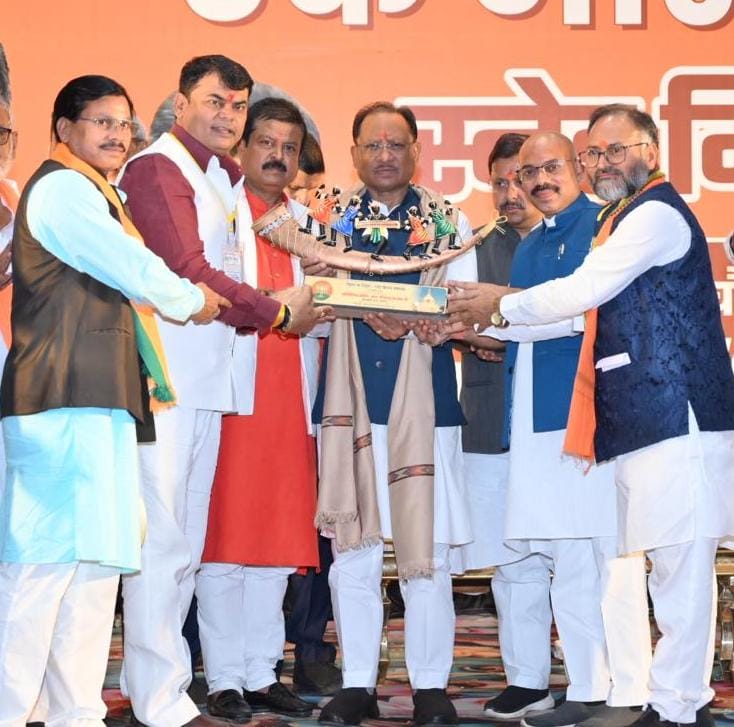The Culture of Bihar and Chhattisgarh are Deeply Connected – Chief Minister Sai

Raipur, March 22
Chief Minister Shri Vishnu Deo Sai stated that the culture, traditions, festivals, and family values of Bihar and Chhattisgarh are deeply intertwined. This connection is not just geographical but also emotional and cultural. He made these remarks while addressing the “Bihar-Tihar Sneh Milan” event held in Bhilai. The event was organized on the occasion of Bihar Foundation Day under the “Ek Bharat, Shreshtha Bharat” campaign.
Shri Sai said that the bond between Bihar and Chhattisgarh, especially the “roti-beti” (food and marriage) relationship, is not just a saying but has become a social reality. He shared personal experiences, noting that his mother was from undivided Bihar and had a long-standing connection with Jharkhand.
Regarding Chhath Puja, Shri Sai mentioned that the festival is now celebrated with great enthusiasm in Chhattisgarh as well. Beautiful Chhath ghats have been constructed across the state’s ponds and rivers. He also highlighted that he personally funded the construction of a Chhath ghat in Kunakuri, Jashpur district, at a cost of one crore rupees.
Paying homage to the glorious history of Bihar, Shri Sai mentioned that India’s first President, Dr. Rajendra Prasad, was from Bihar. He acknowledged that Bihar is the birthplace of Nalanda University, which made India a global leader in education. Aryabhatt, who discovered zero, was a great personality from Bihar. The social justice leader, Karpoori Thakur, also hailed from Bihar.
Modi’s Guarantee: Not a Promise, but a Resolve – Chief Minister Shri Sai
Shri Sai emphasized that the people of Chhattisgarh trusted Prime Minister Modi’s guarantee, and this trust has allowed the government to serve them. He highlighted that in the past one and a quarter years, several public welfare schemes have been successfully implemented. Under the “Mahatari Vandan Yojana,” more than 70 lakh married mothers and sisters have been provided with a monthly assistance of ₹1000, which has enhanced the economic participation and dignity of women. Through the “Ram Lala Darshan Yojana,” over 20 lakh pilgrims have visited Ayodhya to see Lord Ram. He mentioned that the pilgrimage scheme will be resumed in the new financial year to provide senior citizens and devotees with the opportunity to visit major religious sites in the country.
Support for the “Ek Bharat, Shreshtha Bharat” Concept
Shri Sai praised Prime Minister Modi’s “Ek Bharat, Shreshtha Bharat” campaign, stating that such events reduce linguistic, social, and cultural barriers. Today’s event has become a bridge of brotherhood and cultural understanding between the two states.
Honoring Leaders of Various Communities, Inspiring the New Generation
The Chief Minister honored the community leaders by presenting them with shawls and fruit baskets. He said that honoring social workers is a tradition that inspires future generations.
Shared Cultural Heritage from Litti-Chokha to Tija-Chhath
Shri Sai highlighted the cultural similarities between Bihar and Chhattisgarh, mentioning that whether it’s Bihar’s Litti-Chokha or Chhattisgarh’s Cheela-Fara, Tija or Chhath, both states share a deep cultural connection. Both the Kharmar Chhath and Chhath Puja festivals symbolize reverence for maternal strength and nature.
The Chief Minister welcomed all Bihari brothers and sisters to Chhattisgarh and said that together, we will advance Prime Minister Modi’s vision of “Ek Bharat, Shreshtha Bharat.” This event is an example of mutual love, harmony, and national unity.
Bihar’s Minister for Road Construction, Shri Nitin Nabin, stated that the objective of Bihar Day is to understand and pass on our historical and cultural heritage to the next generation. He also highlighted the significant progress made in education, health, and infrastructure in Bihar.
Present at the event were MLA Shri Rakesh Sen, former Assembly Speaker Shri Prem Prakash Pandey, District Panchayat President Smt. Saraswati Banjare, Mayor of Durg Municipal Corporation Smt. Alka Bagmar, other public representatives, and numerous prominent citizens.
